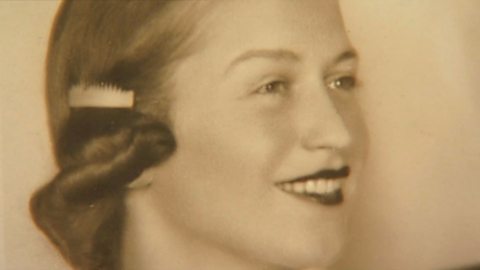DAN SNOW: Hi, I'm Dan Snow, and I'm at the Holocaust exhibition at the Imperial War Museum looking at some of the terrible events that saw six million Jews lose their lives between 1941 and 1945. When we look back at those times it's hard to understand how the Nazi soldiers responsible for the genocide could carry out such evil acts.
DAN SNOW: But the clip I have for you now gives some insight into the thoughts of one of the worst offenders, the commander of the notorious Auschwitz concentration camp, Rudolph Hoss.
NARRATOR: Rudolph Hoss passed the time before his trial recording his experience of commandant of Auschwitz and his service in the SS. It's a remarkable document of great historical importance, offering us an insight into his mentality. He reveals how he watched women and children being taken to the early improvised gas chambers in cottages at Birkenau.
RUDOLPH HOSS: "One woman approached me as she walked past and pointed at her four children, who were manfully helping the smallest ones over the rough ground, and whispered, 'How can you bring yourself to kill such beautiful darling children? Have you no heart at all?'"
NARRATOR: Hoss wrote that he would ride his horse to clear his mind after such incidents, but that he had no regrets.
RUDOLPH HOSS: "The reasons behind the extermination program seemed, to me, to be right."
NARRATOR: All the time Hoss was killing women and children at Auschwitz he was also living with his own family, just yards from the main camp.
RUDOLPH HOSS: "When I saw my children happily play, the thought would often come to me, 'how long will our happiness last?' In the summer they splashed in the river Sola. Their greatest joy was when Daddy bathed with them. He had, however, so little time for all these childish pleasures. I always felt that I had to be on duty the whole time. Again and again my wife reproached me and said, 'You must think not only of the service always, but of your family too.'"
NARRATOR: Rudolf Hoss, the man who had been in charge of the site of the greatest mass murder in the history of the world, never in his memoirs expressed any real remorse for his crimes. Instead, looking back, there was just one thing above all he wished he'd done differently.
RUDOLPH HOSS: "Today I deeply regret that I did not devote more time to my family."
NARRATOR: After a trial lasting three weeks, Hoss was sentenced to death. To be hanged on a specially constructed gallows on the site of his crimes at Auschwitz.
TRANSLATOR: During the execution, when they were leading him to the gallows, Hoss looked calm. When you go to your death you're normally not calm. I know that because, more than once, we had experienced such moments ourselves when death had been close by. When he had been master of life and death.
TRANSLATOR: I thought, as he climbed to the gallows, up the steps, knowing him to be a Nazi, a hardened party member, that he would say something. Like make a statement to the glory of the Nazi ideology that he was dying for. But no, he didn’t say a word. And during the execution I thought, "One life for so many millions of people? Is that not too little?"
DAN SNOW: Four days before his execution, Hoss acknowledged his crimes, saying that he had sinned gravely against humanity and caused unspeakable suffering. Adding, "May the facts which are now coming out make the repetition of such cruel acts impossible for all time."
Video summary
Dan Snow introduces a report about the role of Rudolph Höss, the commandant of Auschwitz, in the Holocaust.
Höss wrote detailed notes on his role at Auschwitz while he was awaiting trial.
This report looks at his testimony and his lack of remorse for his role in the Holocaust.
He lived with his family near to Auschwitz, and claimed his only regret was not spending more time with his family.
Höss was sentenced to death after a three-week trial.
This short film is from the BBC series, World War Two with Dan Snow.
This short film contains scenes which viewers may find upsetting. The films are intended for classroom use but teacher review is recommended prior to watching with your pupils. You know best the limit of your pupils, and BBC Teach does not accept any responsibility for pupil distress.
Teacher Notes
Key Stage 3:
Students could be asked to describe what they think of Höss' testimony, what they think of his lack of remorse and the way he speaks about his role in the Holocaust.
There could also be a discussion about the evidence from Stanislaw Hantz- how did he feel about Höss' execution? Who else should be held accountable for the events at Auschwitz?
Key Stage 4:
Students could use this short film as part of a study on responsibility for the Holocaust.
Students could be asked to discuss all of the different groups and individuals who were involved in allowing the Holocaust to happen.
This could be used as part of a debate on the ‘functionalism versus structuralism’ debate about the Holocaust.
This short film will be relevant for teaching KS3 and KS4/GCSE history in England, Wales and Northern Ireland and National 4/5 history in Scotland.
What were conditions like at Auschwitz? video
Dan Snow introduces a clip about the brutal conditions faced by people at Auschwitz, including testimony from a survivor.
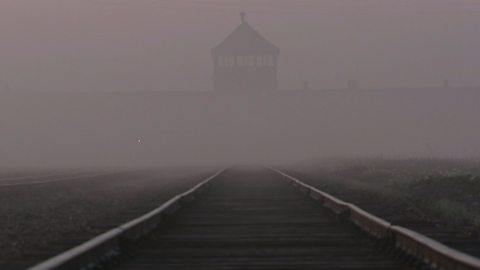
How did Auschwitz expand? video
Dan Snow introduces a clip about the expansion of Auschwitz to deal with the number of Jewish people being transported to concentration camps.
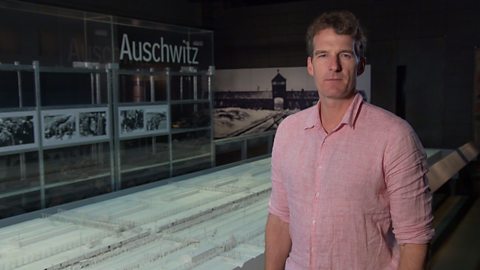
How did the use of gas chambers develop in the Holocaust? video
A look at the introduction of gas chambers at Auschwitz, how the Nazis started using gas vans and then going on to use gas chambers at camps.
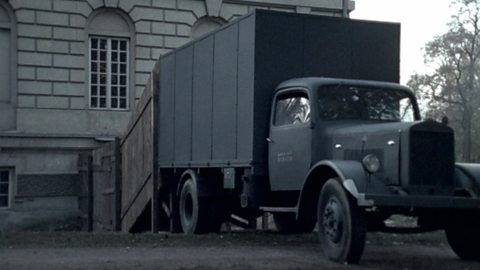
What happened in the gas chambers at Auschwitz? video
A report about the gas chambers at Auschwitz, including some of the testimony from Rudolph Höss.
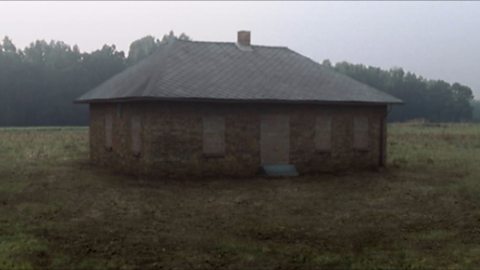
How did a pregnant woman survive the Holocaust? video
The story of Anka, who was pregnant when she arrived at Auschwitz, yet managed to survive and give birth to a daughter, Eva.
